
News
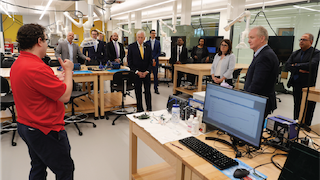 May 30, 2025
May 30, 2025
Innovation and Collaboration: Congressional Leaders Visit Southern Maryland
The University of Maryland (UMD) MATRIX Lab hosted part of a Congressional visit to Southern Maryland by U.S. Senator Chris Van Hollen and U.S. Representatives Steny Hoyer and Sarah Elfreth. On May 19, the members of Congress, plus U.S. Senator Angela Alsobrooks earlier in the day, toured the Naval Air Station Patuxent River, the USMSM SMART Building, and the MATRIX Lab to learn about how different sectors collaborate to teach students in-demand skills, strengthening the region’s workforce and its economy.
“I am proud of our outstanding federal and state representatives for all they do to provide access and opportunities for our students across the state of Maryland. Education and research are always the backbones of what makes the U.S. the world’s leader in science and technology,” said said Dr. Reza Ghodssi, Distinguished University Professor at UMD and the Executive Director of Research and Innovation at the MATRIX Lab. “Thank you to Senator Van Hollen, Representative Steny Hoyer, and Representative Sarah Elfreth for touring the MATRIX Lab during their visit to Southern Maryland and meeting our students and researchers.”
At the MATRIX Lab, representatives from organizations presented examples of how academia, military, government, industry, and nonprofit organizations collaborate to create opportunities in Southern Maryland.
Speakers represented USMSM, the Southern Maryland Navy Alliance (SMNA), St. Mary’s County Economic Development, the Patuxent Partnership, UMD, and the College of Southern Maryland (CSM).
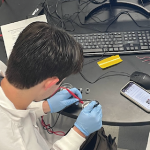 April 23, 2025
April 23, 2025
An Advanced Space for Enhanced Education
Southern Maryland’s Advanced Manufacturing Lab (AML) is now fully operational.
The space, located inside the USMSM SMART Building in the University of Maryland (UMD) MATRIX Lab’s Project Assembly Area, allows for advanced microelectronics devices and systems fabrication using ‘cleanroom-free’ methodologies. The “AML @ SMART” enables iterative prototyping at the micro- and meso-scale, as well as benchtop evaluation within simulated environments. Because of the MATRIX Lab’s focus on autonomous technologies, the lab is specially designed to integrate sensors and devices with autonomous systems.
“The AML @ SMART has been curated to provide access to cutting-edge technologies,” said Dr. Justin Stine, Director of Remote Sensing and Microsystems at the MATRIX Lab and AML @ SMART developer. “Each piece of equipment was chosen to address a step of the microelectronics fabrication process, from design and prototyping to testing and evaluation.”
“These AML courses are designed to close the skill gap between education and the microelectronics industry,” said Dr. Reza Ghodssi, Herbert Rabin Distinguished Chair in Engineering at UMD and the Executive Director of Research and Innovation at the MATRIX Lab. “The students and professionals choosing to learn these highly sought-after, transferable manufacturing skills will have a leg up in the workforce.”
The courses are modeled after the AML course on UMD’s College Park campus. Because the course is modular, it could easily be replicated, and it will be taught in Southern Maryland in fall 2025. The development team was able to quickly bring it to the region by following the best practices learned at College Park. You can learn more about AML development in our previous story. In the future, the course could be taught across University System of Maryland campuses.
The MATRIX Lab will begin offering a new AML short courses focused on printed circuit board (PCB) design in summer 2025. MATRIX Lab’s Dr. Justin Stine will instruct the course “Introduction to PCB Design Essentials: Sensing Systems.” This is a unique, valuable opportunity to combine classroom and hands-on learning. Participants will learn skills related to printed circuit board design and manufacturing including soldering and 3D printing. Learn more and register on the course’s web page.
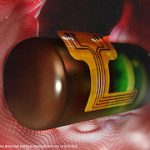 April 7, 2025
April 7, 2025
Research Paper and Cover Art Now Feature Article in Journal
COLLEGE PARK, Md. – University of Maryland (UMD) research is published in Microsystems & Nanoengineering, and the paper, along with cover art image, is now on the front page of the journal’s website. Researchers working in Professor Reza Ghodssi’s (ECE/ISR/Fischell Institute Fellow) MEMS Sensors and Actuators Laboratory (MSAL) have been advancing a non-invasive, ingestible capsule that uses wireless technology to provide information to diagnosticians in real-time. It provides an alternative to invasive techniques like endoscopies when monitoring gut health. The capsule is in development and not currently available to the medical community.
The work was published in the journal on February 7, 2025. “An Ingestible Bioimpedance Sensing Device for Wireless Monitoring of Epithelial Barriers” was written by alumnus Brian Holt (M.S. ’24, Electrical Engineering), alumnus and current MATRIX Lab Director of Remote Sensing and Microsystems Justin Stine (Ph.D. ’23, Electrical & Computer Engineering), UMD Research Associate Luke Beardslee, UMD Graduate Student Hammed Ayansola (Department of Animal and Avian Sciences), UMD Assistant Professor Younggeon Jin (Department of Animal and Avian Sciences), Mayo Clinic gastroenterologist Pankaj J. Pasricha, and Dr. Ghodssi.
“This new work is a major step forward towards the use of non-invasive bioimpedance sensing as a diagnostic tool in ingestible technology and leaky gut identification,” says Dr. Reza Ghodssi. “We are grateful that our progress in ingestible capsule development continues to be recognized by Nature’s microsystems and nanotechnology community in this invited article.”
 March 20, 2025
March 20, 2025
Dr. Ghodssi featured in the News on MATRIX Lab Industry Advisory Board
The University of Maryland (UMD) Clark School of Engineering MATRIX Lab has completed and formalized its inaugural Industry Advisory Board (IAB). This diverse group, which covers several sectors, will help establish industry partnerships and guide research.
“This IAB allows the MATRIX Lab to hear directly from industry on how to best execute our mission of preparing students to enter the workforce,” Dr. Reza Ghodssi, Herbert Rabin Distinguished Chair in Engineering at UMD and the Executive Director of Research and Innovation at the MATRIX Lab. “Our new IAB will help the MATRIX Lab advance our research and improve the education we offer by providing real-world assessments of the work we do.”
“We are looking forward to offering the best feedback we can to support both students and researchers,” said Dr. Vikram Manikonda, MATRIX Lab IAB Chair. “This direct connection to cutting-edge research and the future workforce is invaluable, and we hope to take some of what we learn from the University of Maryland and the MATRIX Lab back to our own organizations.”
The MATRIX Lab team will meet with its board members in March 2025 and will include progress updates in our MATRIX Lab newsletter moving forward.
 February 26, 2025
February 26, 2025
MSAL student Sydney Overton receives Graduate School’s Outstanding Graduate Assistant Award
Sydney Overton, a third-year Ph.D. student in electrical engineering, was selected for the University of Maryland Graduate School’s Outstanding Graduate Assistant Award.
The award recognizes the outstanding contributions that graduate assistants provide to students, faculty, departments, administrative units, and the university as a whole. The Graduate School awards approximately 80 Outstanding Graduate Assistant Awards annually. Award winners receive a credit for mandatory fees during the Spring 2025 Semester.
“It’s always nice to be recognized for my hard work,” Overton said. “I’ve been fortunate to have mentors who provide counsel and advocate for me at the department, college, and university levels. This award is incredibly rewarding and speaks to my dedication to both teaching and research as a graduate student. Every graduate student I know is committed to their teaching, research, and coursework, so to be recognized among so many incredible graduate assistants is humbling. I’m very grateful.”
Overton conducts research in the MEMS Sensors and Actuators lab (MSAL) under Herbert Rabin Distinguished Chair in Engineering and Fischell Institute Fellow Reza Ghodssi.
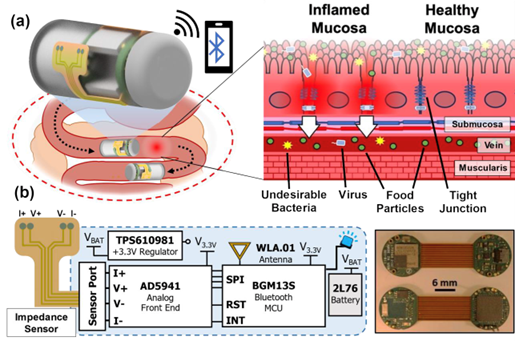 February 11, 2025
February 11, 2025
Ingestible Capsule Advances May Lead to Earlier Detection of Diseases
MSAL alumni Brian Holt, Dr. Justin Stine, and Dr. Luke Beardslee and other University of Maryland-affiliated (UMD) researchers have made important progress in developing an ingestible capsule with non-invasive bioimpedance sensing that can identify the “leaky gut” precursors of many gastrointestinal (GI) tract conditions. A new invited paper detailing the research, “An ingestible bioimpedance sensing device for wireless monitoring of epithelial barriers,” has been published in the Feb. 7, 2025 edition of the Nature journal, Microsystems and Nanoengineering.
The paper was written by Brian Holt, Justin Stine, Luke Beardslee, Hammed Ayansola, Younggeon Jin, Pankaj Pasricha, and Reza Ghodssi. Holt, who earned an M.S. degree at UMD in 2024, is currently a cyber software engineer at Lockheed Martin. Stine is a UMD Assistant Research Scientist at the MATRIX Lab in California, Md. Beardslee is affiliated with the UMD Institute for Systems Research. Ayansola is a Ph.D. student and Jin is an assistant professor in the UMD Department of Animal and Avian Sciences. Pasricha, a physician and researcher specializing in gastroenterology and neurogastroenterology, is director of medicine to the Division of Gastroenterology and Hepatology and Department of Internal Medicine at the Mayo Clinic in Phoenix, Ariz. Ghodssi is a UMD professor with a joint appointment in the Department of Electrical and Computer Engineering and the Institute for Systems Research at the University of Maryland. He is Research Director for the MATRIX Lab and Director of the Microsensors and Actuators Lab. He was the graduate advisor to Holt and Stine.
 January 13, 2025
January 13, 2025
MSAL Alumni Received PAESMEM Award from President Biden
On Jan 13th, 2025, President Biden announced 336 teachers and mentors from around the nation as recipients of the Presidential Awards for Excellence in Mathematics and Science Teaching (PAEMST) and the Presidential Awards for Excellence in Science, Mathematics, and Engineering Mentoring (PAESMEM). These awards honor the vital role that America’s teachers and mentors play in shaping the next generation of technical leaders, including scientists, engineers, explorers, and innovators. MSAL Alumni Dr. Brendan Hanrahan has received such a prestigious award. He first saw the true benefits of mentoring early in his career, as a graduate student working under Dr. Reza Ghodssi, when he started supporting his undergraduate peers.
Dr. Hanrahan is now a senior materials engineer, renowned for his expertise in ferroelectrics and energy applications. He earned his B.S. from Clemson University in 2006. At the University of Maryland, College Park he obtained an M.S. (’09) and a Ph.D. in 2013 in Materials Science and Engineering, focusing his doctoral research on advancing microscale power generation technologies.
 December 9, 2024
December 9, 2024
Autonomy Summit Explores Potential and Challenges of AI
The inaugural University of Maryland (UMD) MATRIX Lab Autonomy Summit brought together leaders, experts, and professionals to explore the most pressing issues surrounding autonomous systems and artificial intelligence (AI).
On November 14, more than 200 attendees representing dozens of different organizations across industry, government, and academia gathered at the USMSM SMART Building in California, Maryland. The day’s presentations, panels, and breakout sessions explored building trust in autonomous systems, bridging gaps between technology development and workforce readiness, and accelerating the innovative use of autonomous technologies across multiple domains. These discussions are now being compiled into actionable takeaways.
The MATRIX Lab organized the event with the support of local government and nonprofit organizations as well as several UMD Clark School of Engineering departments and units. Dr. Reza Ghodssi (ECE/ISR/Fischell Institute) is the UMD Herbert Rabin Distinguished Chair in Engineering and the MATRIX Lab Executive Director of Research and Innovation.
“It was worth the time and effort to bring world class expertise to the region,” Dr. Ghodssi said. “By connecting leaders and experts across multiple sectors, we were able to discuss current and developing issues related to AI and autonomy, identify gaps in the ecosystem, and develop solutions to close those gaps. We will be sharing those takeaways with our partners, so we can all work together to improve and advance this critical field.”
 October 25, 2024
October 25, 2024
Twelve University of Maryland Faculty Affiliate With MATRIX Lab
Twelve University of Maryland faculty members are now affiliated with the MATRIX Lab, the University’s hub for autonomous technologies and uncrewed systems research in Southern Maryland. The group will collaborate with the MATRIX Lab team and take advantage of the SMART Building’s facilities for research and experiments as well as organizing and leading courses and talks.
Dr. Reza Ghodssi is affiliated with the MATRIX Lab, and is also affiliated with the Fischell Department of Bioengineering, the Robert E. Fischell Institute for Biomedical Devices, the Maryland NanoCenter, the Maryland Energy Innovation Institute, and the Department of Materials Science and Engineering.
 October 21, 2024
October 21, 2024
Celebrating Analytical Methods’ highest-cited authors of 2023
Each year – Analytical Methods publishes hundreds of papers pioneering early applications of new analytical and bioanalytical methods and technology demonstrating the potential for societal impact.
The article “A portable electrochemical sensing platform for serotonin detection based on surface-modified carbon fiber microelectrodes” published on Analytical Methods by MSAL alumni Jinjing Han, Justin Stine, Ashley Chapin, and Dr. Reza Ghodssi in 2023 has been proudly listed among the Analytical Methods‘ top 10 most cited papers in 2023.
 September, 2024
September, 2024
MSAL Alumni Dr. Hanrahan listed among the Early Career Distinguished Alumni Society Class of 2024
Dean Samuel Graham, Jr. is pleased to announce the Early Career Distinguished Alumni Society Class of 2024. The Clark School is proud to recognize the innovations, leadership, and impact made by the Clark School’s inaugural class of Early Career Distinguished Alumni Society inductees. These 25 alumni are at the forefront of their respective fields and have demonstrated excellence in leadership, innovation, entrepreneurship and/or service.
MSAL Alumni Dr. Brendan Hanrahan is a senior materials engineer, renowned for his expertise in ferroelectrics and energy applications. He earned his B.S. from Clemson University in 2006. At the University of Maryland, College Park he obtained an M.S. (’09) and a Ph.D. in 2013 in Materials Science and Engineering, focusing his doctoral research on advancing microscale power generation technologies.
 September 6, 2024
September 6, 2024
Two Former Members of MSAL Earn Tenure
Two former students of Herbert Rabin Distinguished Chair in Engineering and Fischell Institute Fellow Reza Ghodssi’s MEMS Sensors and Actuators Laboratory (MSAL) have earned tenured positions at their respective universities. Nima Ghalichechian (ECE MS ’05, Ph.D. ’07) has been promoted to Associate Professor with tenure in the School of Electrical and Computer Engineering at the Georgia Institute of Technology (Georgia Tech), and Thomas Winkler (BIOE Ph.D. 2017) has been promoted to Associate Professor with tenure at the KTH Royal Institute of Technology in Stockholm, Sweden.
“The most rewarding aspect of our job as faculty in academia is seeing our former students and researchers advance in their respective professions and make a positive difference in people’s lives and communities,” Professor Ghodssi said.
Ghalichechian joined Georgia Tech as an Assistant Professor in August 2021. After receiving his Ph.D. from the University of Maryland (UMD) in 2007, he was a Senior Principal Engineer in the research department of Formfactor, Inc., Livermore, CA. In 2012, he joined the Ohio State University (OSU) Department of Electrical and Computer Engineering as a Research Scientist. From there, he rose from Research Assistant Professor to tenure-track Assistant Professor in 2017.
Thomas Winkler also was advised at UMD by Professor Reza Ghodssi. His time in MSAL offered Winkler an opportunity to bridge his interests in microtechnology and mental health. This experience solidified his passion for researching how microsystems can help decode mental health disorders like schizophrenia, which he was able to pursue at KTH for his post-doctoral research. At KTH, Winkler intends to reintroduce a Ph.D.- and Master in Science-level course on organ-on-a-chip systems to educate the next generation of junior engineers on the potential of microsystems tools to solve life science challenges.

August 1, 2024
Dr. Ghodssi Welcomes New Associate Research Professor in MATRIX Lab
The University of Maryland (UMD) Clark School of Engineering MATRIX Lab is welcoming a new Associate Research Professor, Dr. Donald “Bucket” Costello.
Dr. Costello’s research focuses on autonomous systems and how to certify them. His work is making important strides toward a broader use of autonomy. His appointment is expected to enhance the lab’s research and education capabilities.
“We are excited to welcome Dr. Costello to the team,” said MATRIX Lab Executive Director of Research and Innovation Dr. Reza Ghodssi. “The expertise he gained from his decades-long Navy career will drive impactful research and develop important partnerships. We are looking forward to a highly productive future.”
Costello received his PhD in mechanical engineering from UMD. His unique experience of completing the doctorate aboard an aircraft carrier while serving at NAVAIR is described in a story written by UMD communications manager Robert Herschbach.
Costello is joining the MATRIX Lab team part time on August 1, 2024, and full time on January 15, 2025.
 July 17, 2024
July 17, 2024
Dr. Ghodssi Honored With Gaede-Langmuir Award
Professor Reza Ghodssi (ECE/ISR/Fischell Institute), Herbert Rabin Distinguished Chair in Engineering at the University of Maryland (UMD), has received the 2024 Gaede-Langmuir Award from AVS: Science and Technology of Materials, Interfaces, and Processing.
The organization, formerly known as the American Vacuum Society, honored Ghodssi for “pioneering research on developing novel microelectromechanical systems (MEMS) processes, fabrication, and technologies for micro, nano, and bio-devices and systems and their momentous impact on small-scale power, optical, and biomedical applications.”
Ghodssi, Executive Director of Research and Innovation of the A. James Clark School of Engineering’s MATRIX Lab in Southern Maryland, a UMD Distinguished Scholar-Teacher, and a former Institute for Systems Research (ISR) Director, has led the MEMS Sensors and Actuators Laboratory (MSAL) since its inception in 2000. The group spearheads innovative biomedical and clinical applications related to gastrointestinal diagnostics, biofilm monitoring and inhibition, and gut-brain interaction. Complementing this research, the lab also has been helping to develop novel solutions for energy storage, harvesting, and conversion.
Ghodssi is the second UMD faculty member to receive the award. Distinguished University Professor and former ISR Director Gary Rubloff (MSE/ISR) won the award in 2000 in recognition of his “inventive application of surface science and vacuum technology to the semiconductor industry, and for fostering an effective bridge between AVS research and manufacturing.”
Ghodssi will receive the award at the AVS 70th International Symposium and Exhibition, to be held in Tampa, FL from Nov. 3–8, 2024.
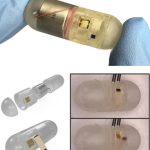 July 2, 2024
July 2, 2024
New Features on Ingestible Capsule Will Deliver Targeted Drugs to Better Treat IBD, Crohn’s Disease
The newest version of an ingestible capsule being developed by the University of Maryland (UMD) MEMS Sensors and Actuators Laboratory (MSAL) appears in the Aug. 16, 2024 issue of Device, a Cell Press journal. “Magnetically triggered ingestible capsule for localized microneedle drug delivery” describes a remotely triggerable local drug injection system for the gastrointestinal (GI) tract. Although not yet available to the medical community, this advance points to the day clinicians could use an ingestible capsule to better treat intestinal diseases. The capsule can be directly controlled with external magnets, using dissolvable microneedles that provide adaptable, efficient, fast, localized drug delivery.
Materials Science and Engineering Ph.D. student Joshua Levy is the first author. In early June 2024, he won the Janusz Bryzek Abundance through MEMS Award at the Workshop on Solid-State Sensors, Actuators, and Microsystems (aka the Hilton Head Workshop) for related work. Other authors include Fischell Department of Bioengineering graduate student Michael Straker, 2024 Electrical and Computer Engineering Ph.D. recipient Justin Stine, UMD Research Associate Luke Beardslee (ISR) and Herbert Rabin Distinguished Chair in Engineering, Professor Reza Ghodssi (ECE/ISR). Levy, Straker, Stine and Ghodssi are also affiliated with the Robert E. Fischell Institute for Biomedical Devices. Dr. Ghodssi is the advisor to Levy, Straker and Stine.
 June 12, 2024
June 12, 2024
Forty Years of MEMS Research at the Hilton Head Workshop
From June 2–6, the Transducer Research Foundation (TRF) marked the 40th anniversary of its flagship event, the Hilton Head Workshop. Officially known as the “Workshop on Solid-State Sensors, Actuators, and Microsystems,” it has been held in Hilton Head, S.C., every two years since its inception in 1984. The prestigious research-oriented agenda gives the international MEMS (micro-electro-mechanical) and Microsystems community a place to gather and discuss the Grand Challenges and societal impact of MEMS devices, technologies and systems.
Currently led by President Reza Ghodssi (ECE/ISR/Fischell Institute), the sponsoring organization TRF is dedicated to promoting research related to transducers, microsystems, and nanosystems. The Hilton Head Workshop brings together students and experts from academia, industry and government, with a particular emphasis on students. Because they are the future of the microsystems industry, the workshop encourages them to participate through training, mentoring, networking, and exchanging ideas.
University of Maryland participants
UMD faculty participating in the workshop were Pamela Abshire (ECE/ISR), Kevin Daniels (ECE), Ryan Sochol (ME), and Reza Ghodssi (ECE/ISR). Ghodssi’s MEMS Sensors and Actuators Lab (MSAL)—now celebrating its 25th year—gave four oral presentations and showed four posters at this very competitive workshop.
University of Maryland award winners
University of Maryland students won four awards; two were from Ryan Sochol’s group and two were from Reza Ghodssi’s MSAL Lab. View a list of all the 2024 award winners on the Hilton Head Workshop website.
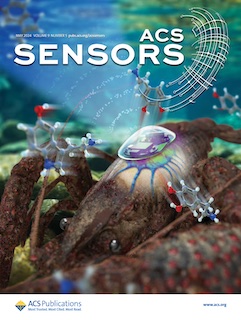 May 28, 2024
May 28, 2024
MSAL Published Two Papers on Gut-Microbiome-Brain-Axis (GMBA)
Two papers authored by UMD PhD students have been receiving attention for their work on the Gut-Microbiome-Brain-Axis (GMBA). The research for both papers was made possible by NSF’s Integrative Strategies for Understanding Neural and Cognitive Systems (NCS) program. The mission of the NCS program is to promote NSF’s research in the development of neurotechnologies, particularly through the Understanding the Brain program and the Brain Research through Advancing Innovative Neurotechnologies (BRAIN) Initiative. Both programs emphasize interdisciplinary research across the sciences and engineering.
The project, led by PI Reza Ghodssi (ECE/ISR/Fischell Institute/Bioengineering), is titled “Developing engineering solutions to investigate microbiome-to-neuron communication” and is focused on investigating the complex effects of intestinal serotonin on both gut and brain health, developing a realistic picture of the gut-microbiome-brain axis system (GMBA). The program was a joint effort with Co-PIs Jens Herberholz in neuroscience (Department of Psychology, CNS), Wolfgang Losert in data science (Physics/IPST/IREAP), and William Bentley in molecular biology (BioE/Fischell Institute/IBBR).
ACS Sensors featured the first paper, titled Simultaneous Dopamine and Serotonin Monitoring in Freely Moving Crayfish Using a Wireless Electrochemical Sensing System, on the highly visible inside cover page. The research focuses on the impact of dopamine (DA) and serotonin (5-HT) on physiological and behavioral processes. Jinjing Han (ECE/ISR/Fischell Institute), Ta-wen Ho (Program in Neuroscience and Cognitive Science), Justin M. Stine (ECE/ISR/Fischell Institute), and Sydney N. Overton (ECE/ISR/Fischell Institute), along with Professor Jens Herberholz and Professor Ghodssi, contributed to the work.
The second paper, published in IEEE Sensors, is titled Serotonin Sensing Technologies to Promote Understanding of the Gut-Brain Axis, and was authored by Overton, Han, Michael A. Straker (ISR/ Fischell Institute/Bioengineering), Joshua A. Levy (ISR/Fischell Institute/Materials Science), Stine, and Ho with Herberholz and Ghodssi.
 May 28, 2024
May 28, 2024
FiMSAL Student Recognized as ECE 2024 Outstanding Teaching Assistant
On Thursday, May 16th, 2024, the Department of Electrical and Computer Engineering hosted a ceremony honoring the 2024 Outstanding Teaching Assistant (TA) and Outstanding TA Training and Development Awards Ceremony. Individuals are awarded based on faculty recommendations and TA evaluations.
MSAL graduate student, Brian Holt (ENEE416) mentored by also MSAL Ph.D. student Sydney Overton, has been awarded for this title.
Brian Holt received his Bachelor of Science degree from University of Maryland in Electrical and Computer Engineering in 2022. He continued his study to pursue a PhD degree in University of Maryland and joined MSAL in Fall 2022. His current research interest is the design of an intestinal tissue impedance sensor for the integrated capsule.

March 15, 2024
Fischell Institute Womxn’s History Month Spotlight: Sydney Overton
Sydney Overton is featured on the UMD Fischell Institute Womxn’s History Month Spotlight. Sydney is a second-year electrical engineering Ph.D. student in Fischell Institute Fellow and Herbert Rabin Distinguished Chair in Engineering Reza Ghodssi’s MEMS Sensors and Actuators Lab (MSAL). She graduated from Virginia Tech with her bachelor’s in electrical engineering and physics in 2019.
Overton’s research focuses on developing an ingestible serotonin-sensing capsule device to help elucidate the role of serotonin in the gut microbiota-brain axis (GMBA). This entails developing and characterizing a microneedle electrochemical sensor capable of achieving real-time serotonin measurements in the gut epithelium.
This research is paramount to understanding specific serotonergic mechanisms and the downstream role of serotonin in the GMBA. By creating a sensing platform that is integrated with microneedles, Overton’s goal is to access the region of interest and perform electrochemical sensing simultaneously.
 March 14, 2024
March 14, 2024
Clark School Research Nominated for “Invention of the Year”
An ingestible device for localized drug delivery is nominated for the University of Maryland’s (UMD) Invention of the Year Award in the Life Sciences category. The system uses a 3D printed housing, battery, heating element and flexible cantilever to guide and actuate the capsule made to treat chronic problems in the gastrointestinal tract. The actuator can deliver drug-loaded microneedles to planned locations and deliver multiple doses at different locations. The technology is expected to improve treatment of GI diseases, Like Crohn’s Disease and Ulcerative Colitis, by increasing treatment efficacy while reducing drug side effects.
Professor Reza Ghodssi’s (ECE/ISR/Fischell Institute Fellow) MEMS Sensors and Actuators Laboratory has been working on ingestible capsules for six years. Recently, this research was highlighted as the front cover picture of Advanced Healthcare Materials in February 2024. Materials Science & Engineering Ph.D. student Joshua Levy, Bioengineering Ph.D. Student Michael Straker, UMD Research Associate Luke Beardslee, Alumnus and current MATRIX Lab Assistant Research Scientist Justin Stine (Ph.D. ’23, Electrical & Computer Engineering), UMD Visiting Assistant Professor Santiago Botasini, Mayo Clinic gastroenterologist Pankaj J. Pasricha, alumnus Hossein Abianeh ’22, Electrical & Computer Engineering and Ghodssi have contributed to the research.
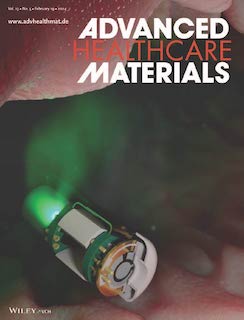 February 19, 2024
February 19, 2024
Ingestible Capsule Technology Research on Front Cover of Journal
Researchers working in Professor Reza Ghodssi’s (ECE/ISR/Fischell Institute Fellow) MEMS Sensors and Actuators Laboratory (MSAL) have been advancing a non-invasive, ingestible capsule that uses wireless technology to provide information to diagnosticians in real-time, and their cover design was highlighted as the front cover picture of the journal. It provides an alternative to invasive techniques like endoscopies when monitoring gut health. The capsule is in development and not currently available to the medical community.
The work is in the latest issue of the journal, Volume 13, Issue 5, published February 19, 2024. “Miniaturized Capsule System Towards Real-time Electrochemical Detection of H2S in the Gastrointestinal Tract” was written by alumnus and current MATRIX Lab Assistant Research Scientist Justin Stine (ECE Ph.D. 2023), alumnus Hossein Abianeh (EE BS 2022), ECE Ph.D. student Katie Ruland and MSE Ph.D. student Joshua Levy, UMD Research Associate Luke Beardslee, UMD Visiting Assistant Professor Santiago Botasini, Mayo Clinic gastroenterologist Pankaj J. Pasricha, and Ghodssi.
 February 5, 2024
February 5, 2024
Governor’s Cabinet Meeting Features Peek into Southern Maryland Research and Collaboration
State leaders had the opportunity to see where education and research meet in St. Mary’s County.
As part of the governor’s cabinet road tour, Governor Moore, Lieutenant Governor Aruna Miller, and the Moore-Miller Administration cabinet explored local landmarks including the Naval Air Station (NAS) Patuxent River and Leonardtown before holding Friday’s meeting.
After the meeting, the group, including Congressman Steny Hoyer, toured the USMSM SMART Building. They saw the labs where USMSM’s partners, including the University of Maryland (UMD), hold classes. They walked through the UMD MATRIX Lab research spaces, including the Project Assembly Area, water tunnel, anechoic chamber, and Open Air-Land Lab, a large space for flying drones and operating ground robots.
In the Project Assembly Area, Gov. Moore and Lt. Gov. Miller met MATRIX Lab Assistant Research Scientist Dr. Justin Stine, who showed them his ingestible capsule research alongside Keith Davenport. Dr. Stine is mentoring Davenport, a College of Southern Maryland and DREEM program student who plans to transfer to UMD’s engineering program at USMSM in Fall 2024.
After the tour, Gov. Moore and Lt. Gov. Miller learned about Southern Maryland’s economic and physical assets through a series of presentations led by Dr. Reza Ghodssi, Executive Director of Research and Innovation for the UMD MATRIX Lab.
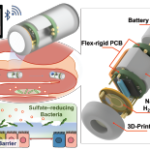
December 14, 2023
MSAL Published New Paper on Ingestible Capsule Technology in Gut Health Monitoring
Researchers working in Professor Reza Ghodssi’s (ECE/ISR/Fischell Institute Fellow) MEMS Sensors and Actuators Laboratory (MSAL) at the University of Maryland (UMD) have been advancing a non-invasive, ingestible capsule that uses wireless technology to provide information to diagnosticians in real-time. (The capsule is in development and not currently available to the medical community.)
In November 2023, MSAL published this new research development in the journal Advanced Healthcare Materials. “Miniaturized Capsule System Towards Real-time Electrochemical Detection of H2S in the Gastrointestinal Tract” was written by alumnus and current MATRIX Lab Assistant Research Scientist Justin Stine (ECE Ph.D. 2023), alumnus Hossein Abianeh (EE BS 2022), ECE Ph.D. student Katie Ruland and MSE Ph.D. student Joshua Levy, UMD Research Associate Luke Beardslee, UMD Visiting Assistant Professor Santiago Botasini, Mayo Clinic gastroenterologist Pankaj J. Pasricha, and Ghodssi. Ghodssi is the Ph.D. advisor for both Ruland and Levy.
“The paradigm of ingestible capsules has long fulfilled a diagnostic role for minimally invasive screening, taking images, and measuring our body’s physiology,” Dr. Ghodssi said. “Emerging capsules are challenged to sense complex biomarkers that demand advanced functionality. This makes systems integration and data learning techniques essential to capsule design.”
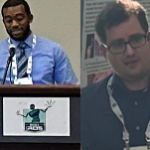 October 6, 2023
October 6, 2023
Straker and Stine Awarded Runner-Up for Best Poster at IEEE Conference
Two members of MSAL, Justin Stine and Michael Straker, were separately awarded runner-up for best poster at the Robots for the Gut workshop as part of the IEEE/RSJ International Conference on Intelligent Robots and Systems, held from October 1-5 in Detroit, Mich.
Justin Stine ‘23, electrical and computer engineering, Ph.D., a researcher with expertise on Microsystems Autonomy at the MATRIX Lab in Southern Maryland, presented a poster titled “Wireless Ingestible Capsule System for Electrochemical Detection of Hydrogen Sulfide in the GI Tract,” which was a culmination of two conference proceedings, the Hilton Head 2022 Workshop, and Transducers 2023.
Michael Straker, a BIOE Ph.D. student, presented a poster titled “Bilayer Functional Packaging Strategy for Ingestible Actuators,” which detailed key results from an article he and his lab published earlier this year in Nature – Microsystems & Nanoengineering.
 October 4, 2023
October 4, 2023
New, Innovative UMD Course Teaches In-Demand Skills
A new approach to teaching advanced fabrication skills is leading the way in preparing a semiconductor manufacturing workforce for the future. The University of Maryland (UMD) now offers ENEE 419M, “Advanced Manufacturing Lab” (AML), an innovative, multidisciplinary class for undergraduates and select graduate students. A new teaching method being pioneered in this course eventually will allow universities to teach in-demand skills and provide broad access to state-of-the-art technology throughout the country. This course is now being taught at the College Park campus and will be offered at the University System of Maryland at Southern Maryland UMD MATRIX Lab in Fall 2024.
The AML is a joint effort between Dr. Ghodssi and Assistant Professor Dr. Kevin Daniels (ECE); they created the course with input from their students and alumni. It is relevant to and supported by multiple UMD units: A. James Clark School of Engineering, Electrical & Computer Engineering, Materials Science & Engineering, Bioengineering, and the Fischell Institute for Biomedical Devices.
 September 28, 2023
September 28, 2023
Horiuchi is the PI, Ghodssi and Abshire are the Co-PIs for NSF ‘ExLENT’ Experiential Learning Project
Associate Professor Timothy Horiuchi (ECE) is the Principal Investigator and Professors Reza Ghodssi (ECE/ISR) and Pamela Abshire (ECE/ISR) are co-PIs for Democratizing Research and Experiential Education for Microelectronics (DREEM), a three-year, $325K National Science Foundation (NSF) grant. Horiuchi is an affiliate faculty member of the Institute for Systems Research.
The new funding is part of NSF’s new $18.8M Experiential Learning for Emerging and Novel Technologies (ExLENT) program for developing a strong key technology workforce. The initial cohort includes 27 teams, tasked with expanding practical learning opportunities and growing talent nationwide.
 September 21, 2023
September 21, 2023
Sydney Overton and JinJing Han Received ECE Awards
On September 20, 2023, the Electrical and Computer Engineering Department presented awards to exemplary graduate students.
Sydney Overton won the George Corcoran Memorial Award for a Graduate Student. This award is presented to graduate teaching assistants in recognition of excellence in teaching. Sydney is advised by Professor Reza Ghodssi.
JinJing Han won the ECE Distinguished Dissertation Award. Han is advised by Professor Reza Ghodssi. His dissertation is titled, Minimally Invasive Neurochemical Sensing System for Ex Vivo And In Vivo Investigation of Serotonergic Modulation.

September 11, 2023
MSAL Alum Thomas Winkler ReceiveD Prestigious ERC Starting Grant
Alumnus Thomas Winkler (BIOE Ph.D. 2017) has been awarded a Starting Grant by the European Research Council (ERC). The €1.5 million funding will further Winkler’s research on modular organ-on-chip technology to better understand neuropsychiatric disorders. Specifically, he hopes to better understand the role of cellular interactions between blood vessels and the nervous system in schizophrenia.
The prestigious Starting Grant supports top young researchers across Europe. The grants are part of the EU’s Horizon Europe program and are invested in scientific projects across all research disciplines. They are designed to help early-stage researchers start their own projects, build teams and pursue their best ideas.
Winkler joined the Technische Universität Braunschweig, Germany in 2021. He leads his own junior research group, the μ4Life – Microsystems for Life Sciences. Winkler’s group is part of the university’s Institute for Microtechnology and Center of Pharmaceutical Engineering.
 August 17, 2023
August 17, 2023
MSAL Student Featured on the Fischell Institute Spotlight Story
MSAL Student Katie Ruland is featured in the UMD ECE News as a Spotlight Story in Fischell Institute.
Katie Ruland graduated this past spring with her master’s degree in electrical engineering from the University of Maryland. This fall, she will pursue her electrical engineering Ph.D. Since January, Ruland has been a member of Fischell Institute Fellow Reza Ghoddsi‘s MEMS Sensors and Actuators Laboratory (MSAL). This summer, she has been working with Fischell Institute Director Bill Bentley’s Biomolecular and Metabolic Engineering laboratory members in continuation of her ingestible electronic capsule research.
In the future, Ruland would like to continue working in biomedical device research. She is thrilled to start her Ph.D. in the fall and continue to explore her research.

May 30, 2023
MSAL Research on Ingestible Pill Featured on Nano Magazine News
Researchers in the University of Maryland’s MEMS Sensors and Actuators Laboratory (MSAL) in the A. James Clark School of Engineering have developed an ingestible capsule with a new packaging technology that can protect its tiny components in the sometimes harsh environment of the GI tract, then dissolve at precise moments and locations needed to deliver drugs, reveal sensors, or carry out other functions.
Their study, published in Microsystems & Nanoengineering, describes how this packaging, called a freestanding region-responsive bilayer (FRRB), can protect the capsule as it navigates the GI tract and performs complex diagnostic and therapeutic tasks like sensing, monitoring, and drug delivery.
“Ingestible capsule devices are the next frontier of medical technology,” said bioengineering Ph.D. student Michael Straker, first author of the paper. “The FRRB is a simple yet elegant solution to one of the major challenges of developing these devices. It can be used to develop creative new designs, allowing sensitive actuators and sensors to reach targeted regions of the GI tract unscathed.”
Co-authors on the paper include materials science and engineering Ph.D. student Joshua Levy, and electrical and computer engineering Ph.D. Justin Stine, Vivian Borbash ’22, research associate Luke Beardslee, and Herbert Rabin Distinguished Chair in Engineering Reza Ghodssi, who directs the MSAL.
 May 30, 2023
May 30, 2023
MSAL Students Recognized as ECE 2023 Outstanding Teaching Assistants
On Friday, May 19th, the Department of Electrical and Computer Engineering Graduate Department hosted the 2023 Outstanding Teaching Assistant (TA) and Outstanding TA Training and Development Awards Ceremony. Individuals are awarded based on faculty recommendations and TA evaluations.
MSAL Ph.D. student, Sydney Overton (TA for ENEE474 and ENEE475) and Master student Katie Ruland (TA for ENEE381) were among the list of students awarded.
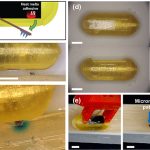 May 21, 2023
May 21, 2023
MSAL Students Published New Research on Ingestible Devices to Treat GI Diseases
The new research has just been published in Microsystems & Nanoengineering. “Freestanding Region Responsive Bilayer for Functional Packaging of Ingestible Devices” introduces FRRB (freestanding region responsive bilayer), which can be readily applied to various functional ingestible capsule components. The paper was written by Bioengineering Ph.D. student Michael Straker, Materials Science and Engineering Ph.D. student Joshua Levy, Electrical and Computer Engineering Ph.D. candidate Justin Stine, alum Vivian Borbash (ECE BS 2022), UMD Research Associate Luke Beardslee and Professor Reza Ghodssi (ECE/ISR), who directs the MSAL lab. Ghodssi is the advisor to the student and alumni authors.
“For many years, pH-responsive materials have been used by pharmaceutical companies for drug delivery,” says Reza Ghodssi. “Our group has demonstrated an integrative hybrid version of this packaging concept towards the promise of ingestible capsules. It is our expectation that this manufacturing approach will widen the design paradigm of developing minimally invasive micro/nano/bio devices and systems for health care monitoring, treatment, and prevention applications.”
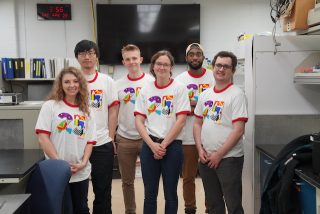 May 4, 2023
May 4, 2023
MSAL Celebrates Maryland Day in its 25th Year Anniversary
This past Saturday, the University of Maryland celebrated its 25th anniversary of Maryland Day, its largest annual community outreach event. The Fischell Institute was represented by Fischell Institute Fellows Dr. Chris Jewell and Dr. Reza Ghodssi labs.
MSAL invited visitors to their lab to show off the scientific concepts they use in devices. The lab’s ingestible devices, accelerometer wand, and heart rate monitor were especially interesting to kids.
“This was our lab’s 22nd Maryland Day since I came to UMD in 2000. It is always a joy for us to showcase what we do on campus,” Dr. Ghodssi said. “The early exposure to science and technology we offer children during their visits to our research laboratories is the most rewarding part of what we do at Maryland Day.” The Ghodssi lab took Maryland Day as an opportunity to showcase how the sensors and actuators they research are a part of daily life. For example, their sensor for heart rate monitoring is similar to those used in fitness bands and health monitoring devices. Accelerometers are used in phones, cars, and video game consoles.
 May 3, 2023
May 3, 2023
MSAL Student Awarded the 2022-2023 ECE Distinguished Dissertation Award
MSAL graduate student Jinjing Han was selected as the recipient of the 2022-2023 ECE Distinguished Dissertation Award. His dissertation titled “Minimally Invasive Neurochemical Sensing System for ex vivo and in vivo Investigation of Serotonergic Modulation” utilizes advancements in nanomaterials, ICs, and additive manufacturing techniques to design and fabricate electrochemical sensing systems for neurotransmitter detection in varying conditions: (1) a portable system for 5-HT detection in body fluids, and (2) a wearable system for continuous in vivo DA and 5-HT monitoring.
Jinjing joined the University of Maryland, Department of Electrical and Computer Engineering in August 2017 to pursue his Ph.D. in Electrical Engineering and joined MSAL in the spring of 2019. His current research interests are in the development of an in vivo serotonin monitoring microsystem.
 May 3, 2023
May 3, 2023
Dr. Ghodssi featured in the news on the partnership between UMD MATRIX Lab and BlueHalo
The University of Maryland (UMD) MATRIX Lab is announcing its partnership with BlueHalo, a leading provider of critical capabilities and technologies across Space, Air, and Cyber domains, on long-range communications and autonomy testing efforts. The UMD UAS Research and Operations Center (UROC) will also be collaborating on these efforts, bringing their drone expertise. The MATRIX Lab and UROC are enthusiastically providing BlueHalo with facilities, resources, and expertise. UROC will be working with BlueHalo initially on Unmanned Aerial Systems (UAS) and communications, while the MATRIX Lab’s open air-land lab and anechoic chamber will be utilized for research and indoor testing.
“We are excited about this partnership,” said Dr. Reza Ghodssi, MATRIX Lab Executive Director of Research and Innovation. “BlueHalo substantively adds value to our endeavor, and we are looking forward to creating new opportunities and solutions for our stakeholders, especially around the test and evaluation of autonomy.”
 May 2, 2023
May 2, 2023
Dr. Ghodssi Invited to Speak at NIMH Workshop on Sensor Technologies
Dr. Reza Ghodssi (ECE/ISR) was an invited speaker at the May 2 National Institute of Mental Health Workshop on Brain Behavior Quantification and Synchronization on May 2. The event theme was “Sensor Technologies to Capture the Complexity of Behavior.” The workshop was held on the National Institutes of Health main campus in Bethesda, Md., where more than 100 attendees were in the audience, in addition to 1,100 people watching online.
Dr. Ghodssi spoke on “Serotonin Sensing Technologies to Promote Understanding of the Gut-Brain Axis and the Physiological Role of Serotonin in Behavior.” He outlined his lab’s (MEMS Sensors and Actuators Laboratory) work in developing systems for in vitro, ex vivo, and in vivo electrochemical sensing of the neurotransmitter serotonin. As part of the gut-brain axis, a bidirectional biochemical signaling pathway between the gastrointestinal tract and the central nervous system, serotonin plays an important physiological role in our behavior, cognition, and pathophysiology. The specific mechanics of how this system works are not well understood.
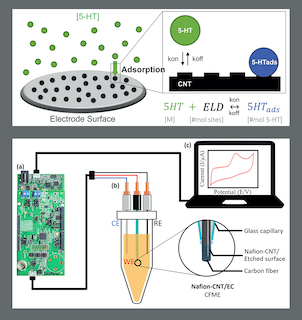
March 6, 2023
MSAL’s Work on Serotonin Characterization and Detection Results in Two Journal Covers
A major focus in MSAL has been sensing and measuring serotonin, a neurotransmitter involved in many biophysiological processes involving the brain and GI tract. Two new papers on serotonin characterization, detection and measurement by MSAL faculty, alumni and students were published as the cover articles of influential journals.
“Adsorption Kinetic Model Predicts and Improves Reliability of Electrochemical Serotonin Detection” was published in February 2023 in the MDPI journal Methods and Protocols. The paper was written by alum Ashley Chapin (BioE PhD 2022), current ECE PhD student Jinjing Han, and their advisor, Professor Reza Ghodssi (ECE/ISR).
“A Portable Electrochemical Sensing Platform for Serotonin Detection Based on Surface-Modified Carbon Fiber Microelectrode” was published in March 2023 in the Royal Society of Chemistry’s Analytical Methods. It was written by Jinjing Han, ECE PhD student Justin Stine, Ashley Chapin and Reza Ghodssi.

February 18, 2023
Research led by Dr. Ghodssi has been awarded the Grand Challenges Grants Program
Reza Ghodssi (ECE/ISR) is one of nine faculty from the Clark School, the College of Mathematical and Natural Sciences, and the College of Agriculture and Natural Resources working on this award in the “global health and climate change” category. Their research will develop technologies to rapidly assess, characterize and manipulate microbial communities—critical to adapting and countering the effects of the changing world. They also will build associated computational analytic frameworks for this data-intensive field.
Seven projects led by or involving Institute for Systems Research and Maryland Robotics Center faculty have been awarded funding through the University of Maryland’s new Grand Challenges Grants Program, the largest and most comprehensive program of its kind the university has ever introduced. The program, its 50 projects, and its $30 million investment, were announced by the university on Feb. 16.

February 13, 2023
Joshua Levy Honored with Clark Doctoral Fellows Mid-Career Award
Joshua Levy of the Department of Material Science and Engineering at the A. James Clark School of Engineering, University of Maryland, has been named a recipient of this year’s Clark Doctoral Fellows Mid-Career Award. The award, issued on February 3, 2023, by the Clark School of Engineering, recognizes his broadly impactful research. Joshua is a member of the MEMS Sensors and Actuators Lab (MSAL) research group, which works on developing ingestible electronic devices to address major healthcare challenges. His work involved methods to deliver drugs in the GI tract to improve drug efficacy and patient comfort. Joshua worked with Dr. Reza Ghodssi, who served as his advisor.
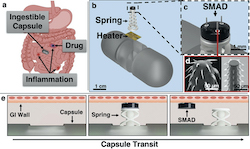 December 5, 2022
December 5, 2022
MSAL Students Published New Research on Capsule Development in the GI System
Professor Reza Ghodssi’s (ECE/ISR) MEMS Sensors and Actuators Laboratory (MSAL) has published new research in the Dec. 4, 2022 issue of the journal Advanced Materials Technologies. “Thermomechanical Soft Actuator for Targeted Delivery of Anchoring Drug Deposits to the GI Tract” was written by Materials Science and Engineering Ph.D. student Joshua Levy, Bioengineering Ph.D. student Michael Straker, Electrical and Computer Engineering Ph.D. student Justin Stine, University of Maryland Research Associate Luke Beardslee, alum Vivian Borbash (ECE B.S. 2022), and Ghodssi. Ghodssi is the Ph.D. advisor for Levy, Straker and Stine; all are associated with the Robert E. Fischell Institute for Biomedical Devices.
 November 17, 2022
November 17, 2022
Ghodssi led NAWCAD-UMD Seed Grant Review and Discussion
Technical experts from the University of Maryland (UMD) and the federal government reviewed and discussed current and future NAWCAD-UMD research seed grants at a SMART Building event in southern Maryland on Nov. 15, 2022. The review was led by Theresa Shafer, Director of Engineering Education and Research Partnerships for NAWCAD; and Dr. Reza Ghodssi, Executive Director of Research and Innovation for the UMD Clark School of Engineering at USMSM. Dr. Ghodssi shared the UMD-USMSM vision for research engagement at the SMART Building and MATRIX Lab, which provide collaborative spaces to build exciting, intellectually driven partnerships.
 August 23, 2022
August 23, 2022
Ghodssi named to new Clark School research and innovation position
Professor Reza Ghodssi has been named the inaugural Executive Director of Research and Innovation for the Clark School of Engineering at the University System of Maryland at Southern Maryland. The announcement was made by Clark School Dean and Nariman Farvadin Professor Samuel Graham, Jr., on Aug. 18. Ghodssi, the Herbet Rabin Distinguished Chair in Engineering and Director of the MEMS Sensors and Actuators Lab in the Department of Electrical and Computer Engineering and Institute for Systems Research, will begin his new position on Sep. 1st, 2022.

August 10, 2022
UMD MSAL Undergraduates’ Rewarding Research Experiences
MSAL undergraduates, Brian Holt (EE B.S. 2022), Hossein Abianeh (EE B.S. 2022), and Vivian Borbash (EE B.S. 2022) who recently graduated from UMD Clark School of Engineering, are featured in the UMD Clark School News for their great research experiences at MSAL this spring and summer. All three undergrads enrolled in Dr. Ghodssi‘s ENEE 499 course had successfully completed their independent research projects under the guidance of MSAL graduate mentors Jinjing Han, Joshua Levy, Justin Stine, and Michael Straker. In June, the three undergrads were given the opportunity to present their research poster at the prestigious Hilton Head 2022 conference at Hilton Head, South Carolina.

July 11, 2022
UMD ECE Alumni Played Crucial Roles in the First Webb Space Telescope Images
On Tuesday July 12th, 2022, NASA released the first Webb Space Telescope Images, which are the deepest and sharpest infrared images of the distant universe so far. UMD ECE alumni Wen-Hsien Chuang (ECE Ph.D. 2005) and Daniel Kelly (ECE M.S. 2005; ECE B.S. 2002), both Dr. Reza Ghodssi‘s early students, have contributed in inventing and building the micro-electromechanical systems (MEMS) microshutter array that controls how light enters Near Infrared Spectograph (NIRSpec).

June 28, 2022
Dr. Alireza Khaligh as the next Editor-in-Chief of IEEE Transactions on Transportation Electrification
Professor Alireza Khaligh (ECE/ISR) has just been named as the next Editor-in-Chief of the IEEE Transactions on Transportation Electrification journal, succeeding the current Editor-in-Chief, Mahesh Krishnamuthy from Illinois Institute of Technology. Professor Khaligh will begin his term in April 2023.

June 24, 2022
Dr. Alireza Khaligh Receives 2022 IEEE PELS Vehicle & Transportation Systems Achievement Award
Professor Alireza Khaligh (ECE/ISR) received the 2022 Institute of Electrical and Electronics Engineers (IEEE) Power Electronic Society (PELS) Vehicle and Transportation Systems Achievement Award. He was cited for contributions to the “Advancement of power electronics for electrified transportation systems including electric vehicles and more electric aircraft.” The award was presented at the IEEE Transportation Electrification Conference and Expo (IEEE ITEC) that took place in Anaheim, Calif.

May 12, 2022
Justin Stine Wins 2022 ECE Distinguished Dissertation Award
MSAL graduate student Justin Stine was selected as the recipient of 2022 ECE Distinguished Dissertation Award. His dissertation titled “Meso-Scale Embedded Sensor-Integrated Systems for Localized Biomedical Monitoring” utilizes advancements in mesoscale manufacturing to develop miniaturized, wireless sensor-integrated prototypes for two case-study applications, one in ingestible devices, and the other in a bioprocessing capsule (bPod).

May 5, 2022
Dr. Reza Ghodssi Honored as Nominee for 2022 Invention of the Year Awards
Robert E. Fischell Institute for Biomedical Devices are celebrating during the 2022 University of Maryland Invention of the Year Awards, and Dr. Reza Ghodssi is honored as a nominee in the Life Sciences category along with his respective collaborators Brantley Hall and Santiago Botasini for their groundbreaking work in wearable devices for measuring gut microbial H2S. At this stage, significant data collection for gut microbial H2S are completed. The current technology focus is on the quatification of H2S as it plays a vital role both as a human gasotransmitter and an inflammation biomarker.
View full article

March 4, 2022
Dr. Pamela Abshire received the MPowering Grant for Project in AI and Medicine
Dr. Pamela Abshire, Professor from Department of Electrical and Computer Engineering (ECE) and Institute for Systems Research, just received the MPowering The State Seed Grant for her groundbreaking research titled “AI Discovery and Sensing for Biomarkers of Chronic Pain,” a joint efforts with Professor Robert Ernst from School of Dentistry, University of Maryland Baltimore . MPowering the State Seed Grant recognizes the interdisplinary research accomplishments between University of Maryland, College Park and University of Maryland, Baltimore.
View full article

January 27, 2022
Dr. Daniels Receives NSF CAREER Award
Department of Electrical and Computer Engineering (ECE) and Institute for Research in Electronics and Applied Physics (IREAP) Assistant Professor Kevin Daniels was named a recipient of a National Science Foundation Faculty Early Career Development (CAREER) award. The five-year, $550,000 award will support his research in investigating ways to improve the speed and selectivity problems in low-cost solid-state gas sensors using layered two-dimensional materials.
View full article
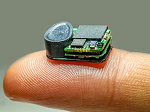 January 27, 2022
January 27, 2022
Alum Timir Datta-Chaudhuri develops VNS biosensor for mice
Alum Timir Datta-Chaudhuri (ECE Ph.D. 2015) and 13 of his colleagues in the Institute of Bioelectronic Medicine at The Feinstein Institutes for Medical Research have developed a fully-implantable wireless bidirectional vagus nerve stimulation (VNS) and sensing device for mice. The invention has the potential to transform how bioelectronic medicine research is conducted in labs worldwide.
View full article

January 11, 2022
Dr. Timothy Horiuchi’s New Research on Acoustic Luneburg Lens (ALL) Pointing New Application
Together with Dr. Miao Yu (ME/ISR) and the ISR Postoctoral Researcher Liuxian Zhao, ISR-affiliated Associate Professor Timothy Horiuchi (ECE) recently finished a new paper investigating the application of the Acoustic Luneburg Lens (ALL) design to acoustic wave propagation. This work is funded by Air Force Center of Excellence on Nature -Inspired Flight Technologies and Ideas (NIFTI) and USDA NIFA Sustainable Agricultural Systems.
 January 2, 2022
January 2, 2022
UMD engineering alumni contributions aboard James Webb Space Telescope
After a successful launch on Dec. 25, the James Webb Space Telescope (Webb)—the largest space observatory ever built—is well on its way to its permanent “L2” parking place 930,000 miles from Earth. The product of decades of development and testing, Webb carries contributions from a generation of University of Maryland engineering alumni.
View full article
 January 2, 2022
January 2, 2022
Joshua Levy wins AVS Outstanding Paper Award
Materials Science and Engineering Ph.D. student Joshua Levy won an Outstanding Paper Award at the American Vacuum Society’s 67th International Symposium, held online October 25–28, 2021. He won the award for the best student presentation in the MEMS & NEMS Technical Group: “Thermally Released Spring-Loaded Platform for Capsule Based Drug Delivery and Sensing.” The paper describes a micro-needle platform being developed for an ingestible capsule that can precisely deliver drugs inside the human gut system.
View full article
 November 9, 2021
November 9, 2021
Are Homemade CPUs Alibaba’s Bid For Independence?
China has taken another step toward semiconductor independence with Alibaba announcing the design of a 5-nanometer technology server chip that is based on Arm Ltd.’s latest instruction set architecture. But, impressive as that feat is, an even more significant chip design development by the Chinese tech giant may be making available the source code to a RISC-V CPU core its own engineers designed. This means other companies can use it in their own processor designs—and escape architecture license fees. (The company made both announcements at its annual cloud convention in its home city of Hangzhou last month.)
View full article
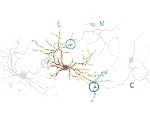 November 4, 2021
November 4, 2021
Dr. Pamela Abshire is the PI for a five-year grant in NSF’s Emerging Frontiers
Professor Pamela Abshire (ECE/ISR) is the principal investigator and ISR-affiliated Associate Professor Timothy Horiuchi (ECE) and Professor Ricardo Araneda (Biology) are the co-PIs for Learning the Rules of Neuronal Learning, a five-year grant in NSF’s Emerging Frontiers “Understanding the Rules of Learning” program. The project will begin Jan. 1, 2022. The researchers will bring together recent technological advances in patterning, electrical recording, optical stimulation, and genetic manipulation of neurons to study how to nurture a healthy culture of neurons while continuously observing and stimulating them at fine scale. They hope to uncover how the individual parts of a single neuron contribute to the overall learning and computation of the neural network.
View full article
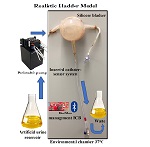 November 2, 2021
November 2, 2021
Biofilm-fighting catheter insert research named ‘featured article’ in IEEE TBME
Published research by University of Maryland scientists on a novel system to combat biofilm in urinary catheters has been named a featured article for November by IEEE Transactions on Biomedical Engineering (TBME). The paper also has led to a recent patent application. The authors are alum Ryan Huiszoon (BIOE Ph.D. 2020), a senior process engineer at Facebook Reality Labs; alum Sangwook Chu (ECE Ph.D. 2018), a process engineer at Applied Materials; ECE Ph.D. students Jinjing Han and Justin Stine; UMD Research Associate Luke Beardslee; and Professor Reza Ghodssi (ECE/ISR). Huiszoon, Chu, Han and Stine are advisees of Dr. Ghodssi. “Integrated System for Bacterial Detection and Biofilm Treatment on Indwelling Urinary Catheters” represents substantial progress on a flexible biofilm detection and treatment system—UMD research that originally began in 2007.
View full article
 November 1, 2021
November 1, 2021
Alum Faheng Zang joins Shanghai Jiao Tong University
Alum Faheng Zang (ECE Ph.D. 2016), a former student of Professor Reza Ghodssi (ECE/ISR), has joined the Department of Micro-Nano Electronics at Shanghai Jiao Tong University as a tenure-track associate professor. He will continue his work in microsystems, microsensors and 3D micro- and nanostructures and explore opportunities to create new nanostructures and new fabrication methods for sensing and energy applications.
View full article
 October 4, 2021
October 4, 2021
ISR honors Ashley Chapin in awards ceremony
Ashley Chapin is a Ph.D. student of Professor Reza Ghodssi (ECE/ISR) and is a part of the MEMS Sensors and Actuators Laboratory (MSAL). Her multidisciplinary work on neuroscience systems integration, along with her leadership and mentorship positions, has earned her the George Harhalakis Outstanding Systems Engineering Graduate Student Award.
View full article
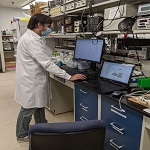 September 14, 2021
September 14, 2021
Fischell Fellowship advances visiting assistant professor’s work
Santiago Botasini, a visiting assistant professor working in Professor Reza Ghodssi’s (ECE/ISR) MEMS Sensors and Actuators Laboratory (MSAL), has been awarded one of the inaugural Fischell Young Investigator Fellowships. The award will enable Botasini to further his research on ingestible devices, sensors, and human gut microbiome-to-neuron communication.
View full article
 August 18, 2021
August 18, 2021
Alum Thomas Winkler joins Technische Universität Braunschweig
University of Maryland and BIOE alum, Thomas Winkler, has taken a new position at the Technische Universität Braunschweig where he is the head of his own junior research group, the μ4Life – Microsystems for Life Sciences. This position is akin to an assistant professorship. Winkler’s laboratory uses microsystems tools to solve life science challenges and he is currently advising two Ph.D. students.
View full article
 August 13, 2021
August 13, 2021
Alum Nima Ghalichechian joins Georgia Tech faculty
University of Maryland and ECE alum, Nima Ghalichechian, has joined the School of Electrical and Computer Engineering at the Georgia Institute of Technology as an assistant professor. He is the principal investigator of the mmWave Antennas and Arrays Laboratory, where he will research applied electromagnetics.
View full article
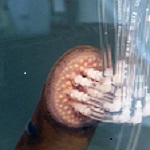 August 12, 2021
August 12, 2021
Measuring the ‘suckiness’ of invasive sea lampreys
The invasive sea lamprey has threatened native species in the Great Lakes for decades. University of Maryland and ECE/ISR alum, Xiaobo Tan, and his colleagues are developing a “smart” sensing panel to determine the sea lamprey’s suction pressure dynamics to investigate a way to control the invasive species. The Michigan State University team has published a paper, “Measurement of suction pressure dynamics of sea lampreys, Petromyzon marinus,” explaining their research.
View full article
 July 1, 2021
July 1, 2021
Three Engineers Among 2021-2022 Distinguished Scholar-Teachers
Three faculty members in the A. James Clark School of Engineering have been selected as 2021–2022 Distinguished Scholar-Teachers by the University of Maryland (UMD). One of these recipients is Dr. Pamela Abshire, a Professor in the Department of Electrical and Computer Engineering and the Institute for Systems Research. The Distinguished Scholar-Teacher Program, established in 1978, honors a small number of senior faculty who have demonstrated outstanding success in both scholarly accomplishment and excellence in teaching. Distinguished Scholar-Teachers make a public presentation on a topic within their scholarly discipline and receive an honorarium to support their professional activities. View the schedule of lectures from awardees.
View full article
 June 17, 2021
June 17, 2021
Alum develops bioelectric effect toothbrush
A Clark School of Engineering alum has transferred his Ph.D. research on the bioelectric effect into a pioneering consumer product that improves mouth and gum health. Young Wook Kim (ECE Ph.D. 2014) is the founder of ProxiHealthcare Inc., which manufactures the new TROMATZ toothbrush. First available in South Korea, the toothbrush employs the bioelectric effect to effectively attack the mouth’s plaque and tartar biofilms. It has received FDA and FCC approval in the United States and is available for purchase on Amazon.
View full article
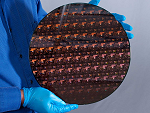 May 06, 2021
May 06, 2021
New chip milestone offers greater efficiency and performance
IBM has become the first in the world to introduce a 2-nanometer (nm) node chip. IBM claims this new chip will improve performance by 45 percent using the same amount of power, or use 75 percent less energy while maintaining the same performance level, as today’s 7 nm-based chips. To give some sense of scale, with 2-nm technology, IBM could put 50 billion transistors onto a chip the size of a fingernail.
The foundation of the chip is nanosheet technology in which each transistor is made up of three stacked horizontal sheets of silicon, each only a few nanometers thick and completely surrounded by a gate. Nanosheet technology is poised to replace so-called FinFet technology named for the fin-like ridges of current-carrying silicon that project from the chip’s surface. The life expectancy of FinFet has been more or less set at the 7-nm node. If it were to go any smaller, transistors would become difficult to switch off: Electrons would leak out, even with the three-sided gates.
View full article
 April 26, 2021
April 26, 2021
Tenured women professors at UMD overcame barriers on their way up the ranks
When Dr. Pamela Abshire was a physics undergraduate at the California Institute of Technology, she was one of few women. She was constantly met with disbelief — her classmates expected her to be studying biology because that’s what many other women studied. She stuck with physics, and nearly 30 years later she’s now a professor of electrical and computer engineering at the University of Maryland — one of six female faculty members in the department. “Sure, there are more things, better things, bigger things I can do. But I’m happy,” Abshire said. “I feel like I’ve gotten recognition, people treat me with respect and that’s good.”
Women in full-time academia positions continue to be underrepresented. In the United States, only 32.5 percent of all tenured professors are women. In Fall 2020, only 26 percent of professors at this university were women. Women of color, mothers and women in STEM make up an even smaller proportion of academia.
View full article
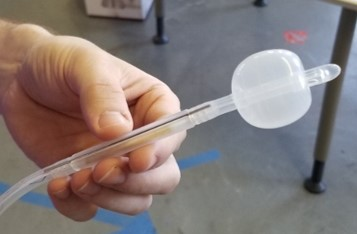 April 02, 2021
April 02, 2021
New Publication Demonstrates Effectiveness of Device for Biofilm Detection and Treatment
MSAL research on the detection and treatment of bacterial biofilm using an integrated flexible system inserted into commercial Foley urinary catheters is proven effective in a recent journal publication in IEEE Transactions on Biomedical Engineering. This innovative system is shown to work in a simulated environment and uses the bioelectric effect, a combination of low voltages of electricity with small doses of antibiotics, to effectively treat the growth of bacterial biofilm.
View full article
 March 18, 2021
March 18, 2021
Khaligh wins Nagamori Award, a prestigious honor in the power electronics and electric machines field
Professor Alireza Khaligh (ECE/ISR) is the winner of the 6th Nagamori Award, a prestigious honor in the fields of power electronics and electric machines. He won the award for “Pioneering research and development on design and control of high-efficiency and high-power-density electric-motor-integrated wide bandgap power electronics.”
About the Award: The Nagamori Award “honors those who bring vitality to technological research of motors and related fields, such as generators and actuators, and supports the researchers and development engineers who strive each day to fulfill their dreams.”
View full article
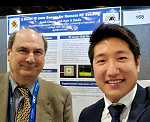 November 12, 2019
November 12, 2019
Professor Iliadis and Graduate Student Chung present a Novel IC CMOS Sensor for Remote RF Sensing at DTC 2019
Professor Agis Iliadis (ECE) and graduate student Jooik Chung presented “A Novel IC CMOS Sensor for Remote RF Sensing” at the Defense Techconnect (DTC) Innovation Summit and Expo on October 8 at the National Harbor, Maryland. Their work deals with the rich RF spectrum of mobile communications, Wi-Fi, Radar, and digital data systems, and interference threats that are very difficult to detect and identify. These RF interference signals can threaten the cybersecurity of protected defense or data systems and can breach the integrity of the system and introduce malware, which opens the door for serious data breaches if not detected and identified. The need for a sensor for detection and identification of the origin and legitimacy of such RF signals is of paramount importance. At the conference, Iliadis and Chung presented a fully integrated CMOS chip with increased sensitivity coupled with micro-patch antennas on-chip for the detection of RF interference signals, evaluating their origin, directionality, distance, and signature, to protect critical defense systems from cyber and other threats. Their work generated interest from many companies and agencies.
View full article
 October 28, 2019
October 28, 2019
Goldsman and colleagues awarded US Patent for SiC-integrated circuit active photodetector
SR-affiliated Professor Neil Goldsman (ECE) and his colleagues were issued U.S. Patent No. 10,446,592 on Oct. 15, 2019 for “silicon carbide integrated circuit active photodetector,” a device that provides accurate, reliable measurement of ultraviolet (UV) radiation.
Co-inventors on the patent are Akin Akturk, Zeynep Dilli, Brendan Cusack and Michael Gross. The patent is assigned to CoolCAD Electronics, LLC, a College Park company founded by Goldsman and Akturk for CAD and custom electronics design. The company carries out R&D projects on a wide cross-section of electronics, including semiconductor device modeling and design, integrated circuit modeling and design, and printed circuit board or full electronic system modeling and design.
View full article


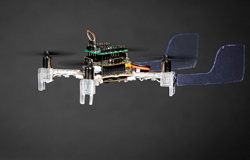
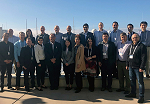 November 23, 2020
November 23, 2020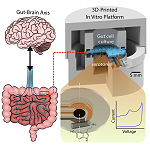 October 14, 2020
October 14, 2020
 April 22, 2020
April 22, 2020 February 08, 2020
February 08, 2020